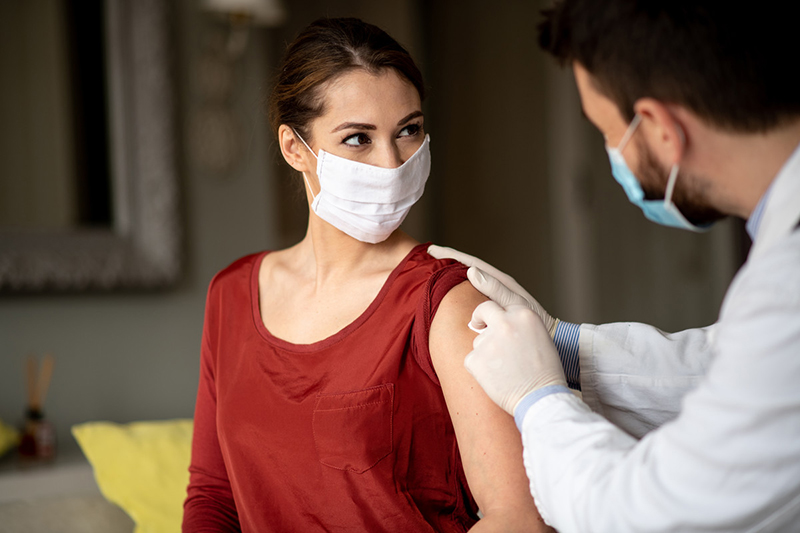 In 2021, anecdotal reports about changes in menstrual cycles following COVID-19 vaccination appeared on social media and in the news. To understand if and how COVID-19 vaccination affected menstruation, NIH prioritized research on this topic. Findings from NIH-funded research include the following:
In 2021, anecdotal reports about changes in menstrual cycles following COVID-19 vaccination appeared on social media and in the news. To understand if and how COVID-19 vaccination affected menstruation, NIH prioritized research on this topic. Findings from NIH-funded research include the following:
Does COVID-19 vaccination affect the menstrual cycle?
Although the vaccine is safe for menstruating women to receive, research showed that the COVID-19 vaccine may cause minor, temporary changes in cycle length and bleeding level/flow.
The changes did not require additional health or medical care, and they went away on their own one or two cycles after vaccination.
Most women experienced no changes in any aspect of their menstrual cycle.
Changes in Cycle Length
Cycle length is the number of days from the first day of bleeding in one menstrual period, to the first day of bleeding in the next menstrual period.
- Some women experienced a cycle length increase of about 1 day.
- Of those who had menstrual changes, a 1-day increase was the most common type of change.
- A few women experienced cycle length increases of more than 1 day.
Changes in Bleeding Level/Flow
Bleeding level or flow refers to how much a woman bleeds during the menstrual period. Typically, “heavy” describes days with more bleeding, and “light” describes days with less bleeding.
- Some women (approximately 4% in one study) experienced heavier flow/bleeding in their first period after receiving the vaccine.
- The bleeding level returned to normal in the next cycle.
- The number of heavy bleeding days stayed relatively the same before and after vaccination.
Does getting COVID-19 affect the menstrual cycle?
Infection with SARS-CoV-2, the virus that causes COVID-19, may affect menstruation in ways similar to the vaccine. Studies showed that some menstruating women who got COVID-19 experienced a slight increase in cycle length and heavy flow. Again, these changes were minor and temporary.
Do different COVID-19 vaccines affect the menstrual cycle differently?
Research showed that mRNA vaccines and traditional vaccines affected menstrual cycles similarly. Some women who got the vaccine—regardless of the kind of vaccine—reported minor, temporary changes in cycle length and flow.
There were no reports of changes to cycle regularity, number of bleeding days, or menstrual pain among those who received any kind of COVID-19 vaccine.
Does the timing of vaccination during the menstrual cycle influence changes in the menstrual cycle?
Research on vaccination timing and menstrual cycle changes is limited to one study, which found that receiving the vaccine during the first half of the cycle (sometimes called the Follicular Phase) was associated with minor, temporary changes in menstrual cycle length.
Vaccination during the second half of the cycle (called the Luteal Phase) was not associated with changes in cycle length.
This study also found that other menstrual changes, such as number of bleeding days or flow, were unlikely to be associated with timing of the vaccine during the menstrual cycle.
Source: COVID-19 vaccination and menstrual cycle length in the Apple Women’s Health Study
Did women with endometriosis experience different menstrual changes after the COVID-19 vaccine than those without endometriosis?
One study showed that women with a history of endometriosis experienced similar menstrual changes after COVID-19 vaccination as women without endometriosis.
Another study showed that women with a history of endometriosis were at greater risk for Long COVID following COVID-19 illness.
Because of this connection, women with a history of endometriosis may want to consider the benefits of preventive measures, such as COVID-19 vaccination.
Are certain groups of menstruating women more likely to experience menstrual cycle changes following COVID-19 vaccination than other groups?
Studies on the effects of COVID-19 vaccination on menstrual cycles are primarily focused on adult women of reproductive age.
Understanding the effects of the COVID-19 vaccine in subpopulations, including teenagers or women using hormonal birth control methods, requires further research. At this time, we do not know if certain groups of menstruating women are more or less likely to experience menstrual changes after vaccination.

 BACK TO TOP
BACK TO TOP